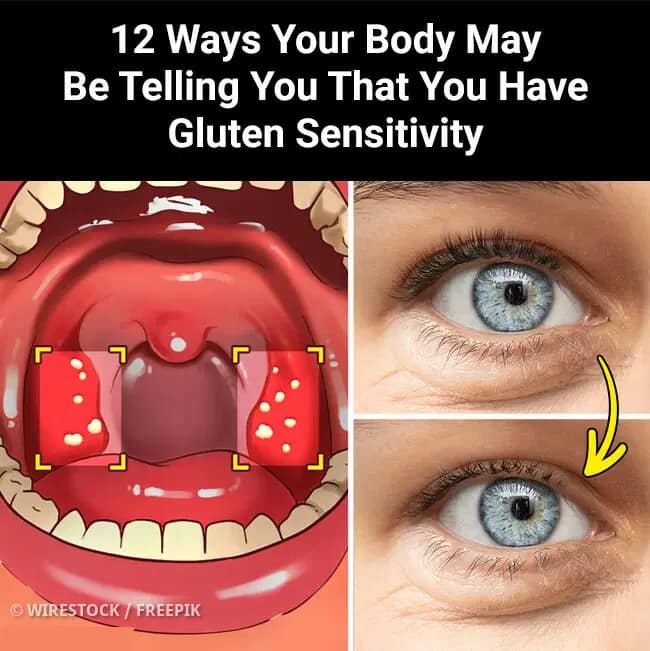Gluten, a protein commonly found in wheat, rye, and barley, might seem harmless for most people. However, for some, it can cause significant health problems that often go unnoticed. Gluten sensitivity, whether mild or severe, can silently impact your health, making it crucial to recognize the signs your body might be sending. These signs can help you take action before long-term harm occurs.

1. Eyelash Loss
Gluten intolerance, particularly in cases like celiac disease, can contribute to hair loss, including eyelashes. This occurs because gluten damages the small intestine, impairing the absorption of vital nutrients like biotin, zinc, and iron—all essential for hair growth. Without these nutrients, hair and eyelashes may begin to thin or fall out.
2. Digestive Problems
One of the most common signs of gluten sensitivity is digestive trouble. Symptoms such as bloating, diarrhea, nausea, abdominal pain, or even constipation often mimic other conditions like Irritable Bowel Syndrome (IBS). Studies show IBS affects up to 15% of the population globally. Misdiagnosing gluten sensitivity as IBS can delay effective treatment, prolonging discomfort and other related issues.
3. Unexplained Weight Changes
Sudden weight fluctuations—whether gain or loss—can be a sign of gluten intolerance. These changes often stem from underlying inflammation or disrupted metabolism caused by gluten. If weight changes occur alongside symptoms like fatigue or nutrient deficiencies, gluten intolerance might be a likely cause.
4. Hormonal Imbalances
Gluten intolerance can disrupt hormonal balance, leading to irregular menstrual cycles, premenstrual syndrome (PMS), and unexpected weight changes. These imbalances are particularly noticeable during life stages like pregnancy, puberty, or menopause. Women, in particular, are more prone to these hormonal disruptions, emphasizing the potential gender-specific effects of gluten sensitivity.
5. Neurological Symptoms
Consuming gluten can trigger inflammation and increase intestinal permeability, leading to neurological symptoms such as brain fog, anxiety, depression, and difficulty concentrating. Individuals with gluten sensitivity often experience migraines, sometimes within an hour of consuming gluten-containing foods. This direct correlation highlights the neurological impact of gluten sensitivity.
6. Skin and Nail Issues
Gluten intolerance can manifest in skin conditions like dermatitis herpetiformis and keratosis pilaris. These conditions cause inflamed, itchy rashes that often appear on the elbows, face, or along the hairline. Brittle nails and eczema-like skin irritations are also common. These symptoms result from systemic inflammation caused by gluten, further showcasing its wide-reaching effects on the body.
7. ADHD Symptoms
Emerging research has linked gluten sensitivity to Attention Deficit Hyperactivity Disorder (ADHD), a condition marked by impulsivity, short attention spans, and difficulty focusing. Both children and adults with gluten sensitivity may experience worsening ADHD symptoms. Adopting a gluten-free diet has been shown to help reduce these symptoms, making it a potential dietary intervention.
8. Oral Health Problems
Poor calcium absorption due to gluten intolerance can lead to oral health issues like tooth decay, cavities, enamel sensitivity, and frequent mouth ulcers. If persistent dental problems arise despite good hygiene, gluten sensitivity might be a contributing factor, necessitating a closer look at dietary habits.
9. Iron Deficiency Anemia
Celiac disease, a severe form of gluten intolerance, often leads to iron deficiency anemia. This condition is characterized by persistent fatigue, pale skin, headaches, and shortness of breath. Even with a diet rich in iron, gluten intolerance damages the intestinal lining, hindering the absorption of this essential nutrient.
10. Autoimmune Disorders
Gluten intolerance is closely associated with autoimmune diseases. Celiac disease, an autoimmune response to gluten, can increase the risk of developing conditions like rheumatoid arthritis, type 1 diabetes, Crohn’s disease, and multiple sclerosis. This connection underscores gluten’s role in broader immune system dysfunction.
11. Tonsil Stones
Though not widely studied, many individuals with gluten sensitivity report frequent tonsil stones—collections of debris and bacteria in the tonsils. Interestingly, transitioning to a gluten-free diet often leads to a noticeable reduction in tonsil stones, suggesting gluten may play a role in their formation.
12. Hair Thinning and Loss
Hair thinning or loss is another common symptom of gluten sensitivity, particularly in those with celiac disease. This is often due to the malabsorption of nutrients like zinc, iron, and biotin, which are essential for hair growth. Gluten-related autoimmune responses can also damage hair follicles, leading to patchy hair loss. A gluten-free diet can significantly improve hair health for those affected.
Managing Gluten Sensitivity
1. Get Tested
If you suspect gluten sensitivity, consult a doctor for a blood test to check for antibodies linked to celiac disease. To ensure accurate results, maintain a gluten-containing diet before testing.
2. Adopt a Gluten-Free Diet
Eliminate foods containing gluten, including:
- Wheat
- Rye
- Barley
- Semolina
- Bulgur
Carefully read product labels and look for “gluten-free” certifications. When dining out, ask about ingredients to avoid hidden sources of gluten.
Final Thoughts
Recognizing the signs of gluten sensitivity is the first step toward improving your health. By addressing these symptoms early and making dietary adjustments, you can avoid long-term complications. A gluten-free lifestyle might seem challenging initially, but the positive impact on your health and quality of life is well worth the effort. Listen to your body—it’s often your best guide to well-being.